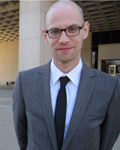2006, 2012
Max A. Bergholz
- Assistant Professor
- Concordia University (Canada)

Abstract
This project examines how Yugoslavia's communist regime constructed and promoted an officially sanctioned memory of the Second World War from 1947 until 1972 through the building of monuments and graves to "fallen soldiers" and "victims of fascist terror." The main questions are: How did the Yugoslav communists create and use these "sites of memory" to transform the war, which had demonstrated extreme levels of inter-ethinc strife among the country's citizens, into a basis for a multi-ethnic socialist state? And how did Yugoslav citizens react to this memory-making project?
Abstract
The wars that ensued with Yugoslavia’s dissolution in the 1990s brought to the fore two vexing questions that, in spite of the large output of scholarly literature on the region in the past fifteen years, have yet to be adequately addressed: What causes neighbors in multi-ethnic communities, who have lived in peace, to murder each other? And what makes it possible for perpetrators and survivors, who have committed and experienced atrocities, to live together again once the killing stops? My book manuscript seeks to answer these questions through a microhistory of the dynamics of mass killing in a Bosnian community in 1941 and the mechanisms of silence among its residents about wartime atrocities after 1945.

